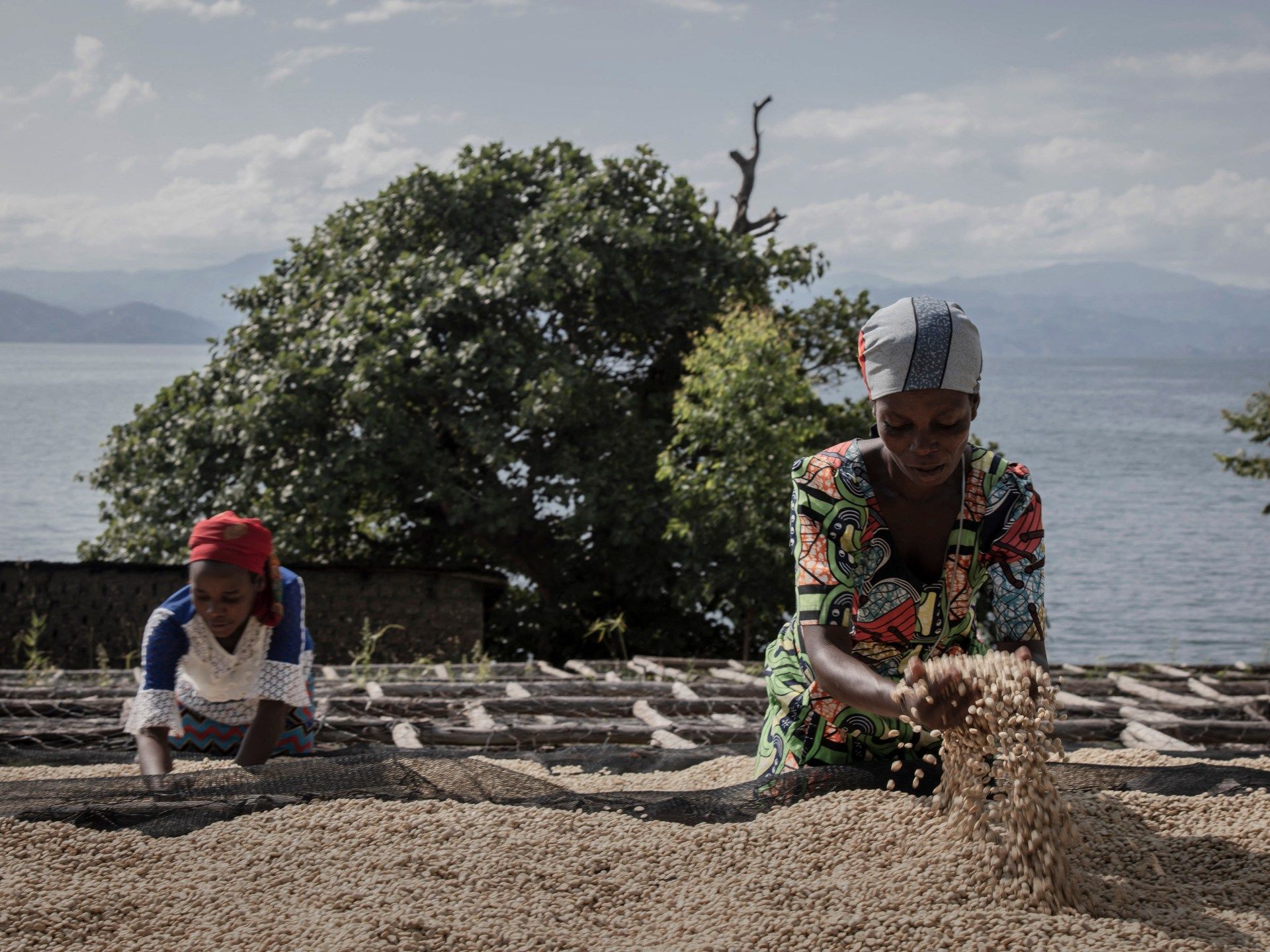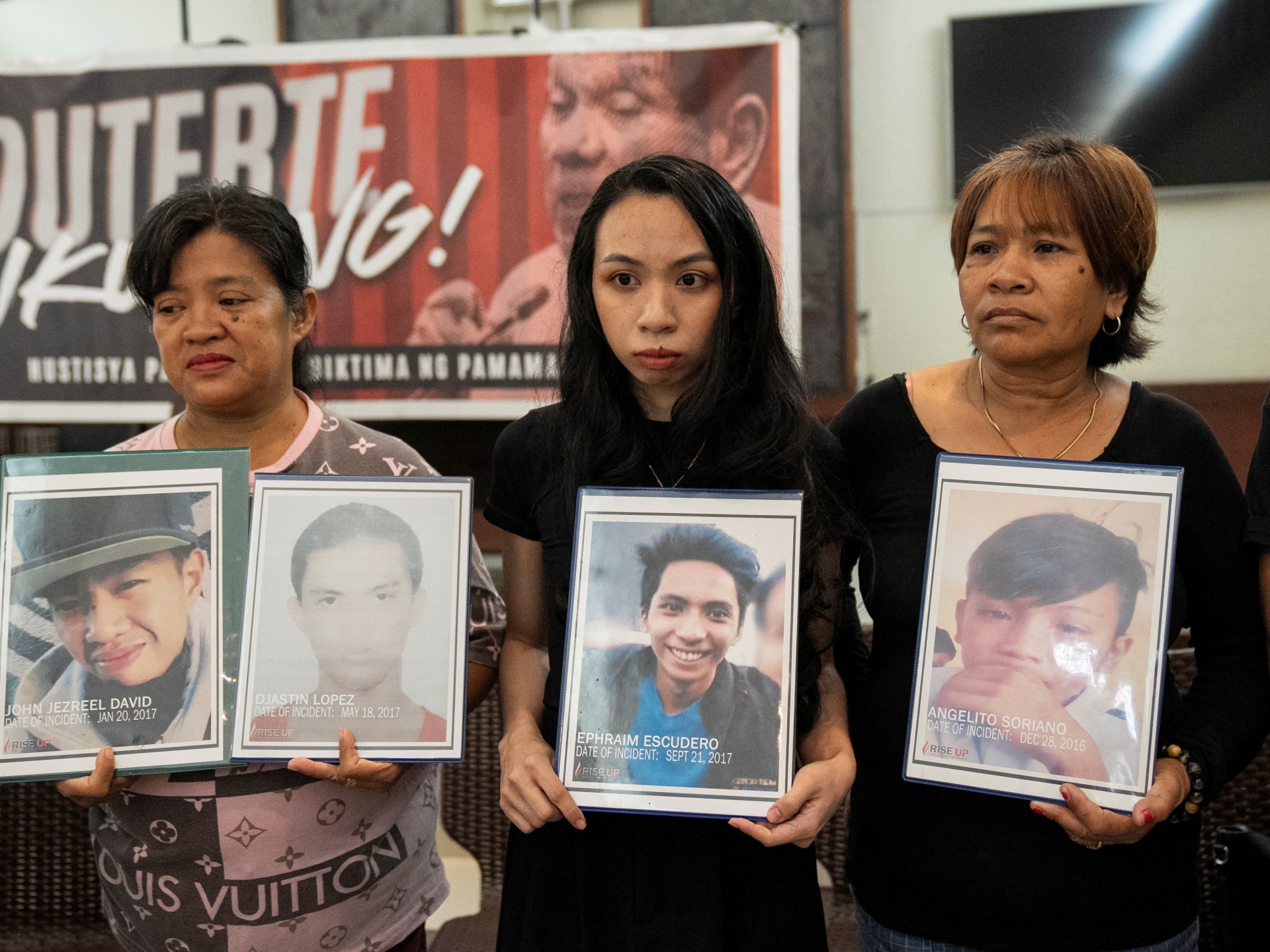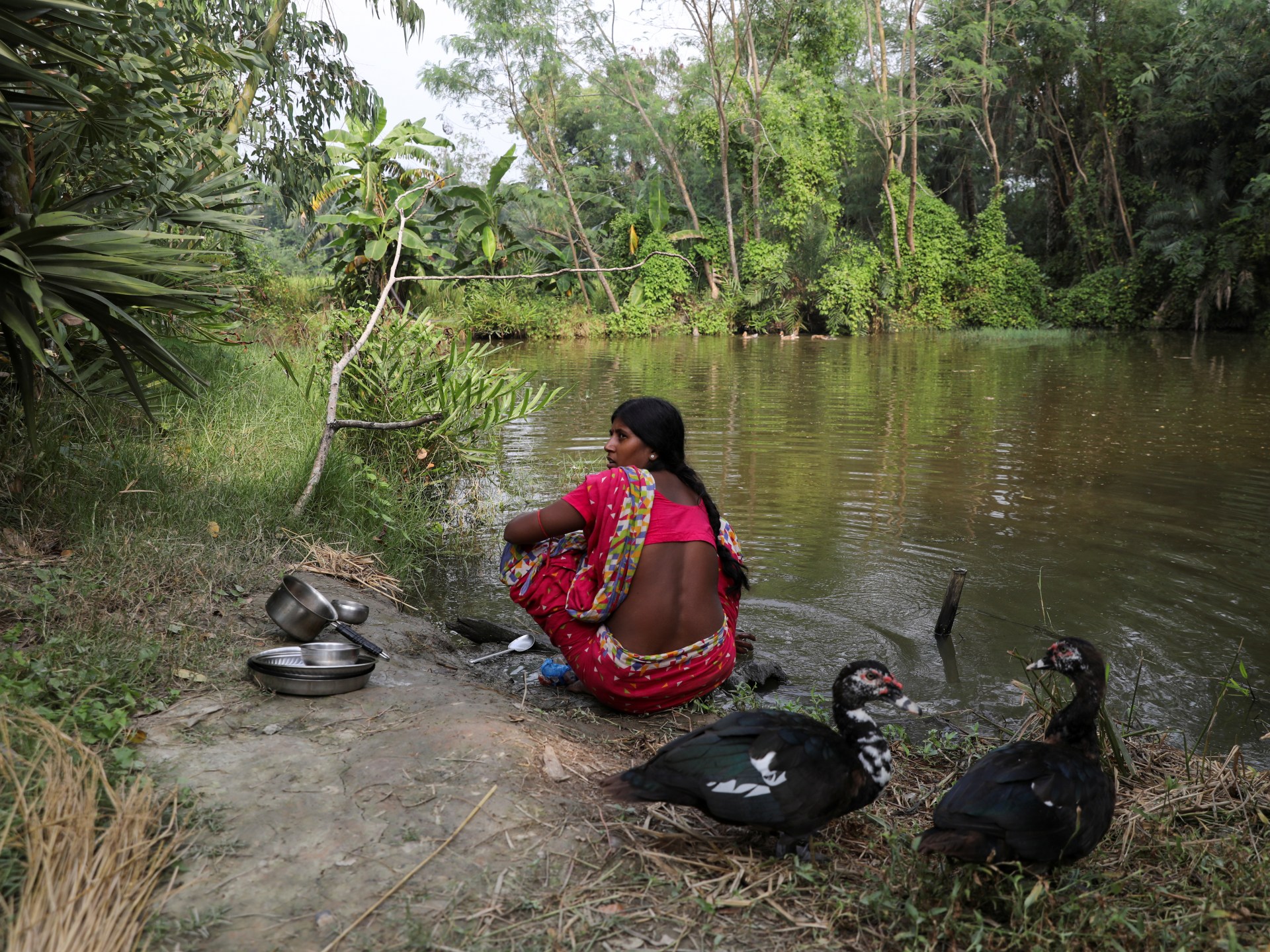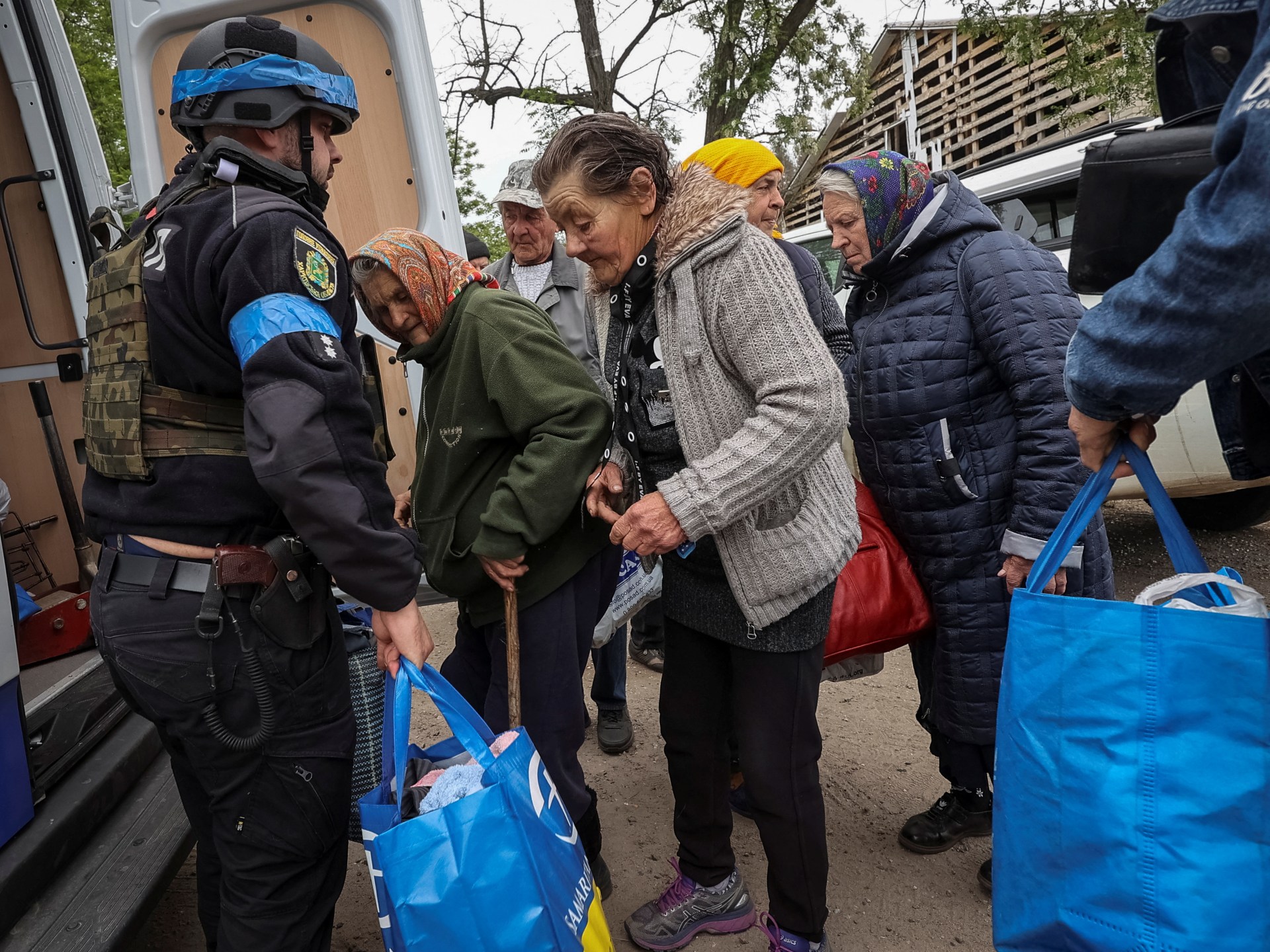Ituri, Democratic Republic of the Congo – Early every morning, 50-year-old Kavira Matsetse walks two hours to reach her coffee plantation in Biakato, in the Ituri province of the north-east of the Democratic Republic of Congo (DRC).
The widow and mother of eight inherited the plantation from her late husband nearly a decade ago and has worked hard to cultivate it ever since.
“My husband was killed in 2015 during attacks in Oicha in the neighbouring province of North Kivu,” she told Al Jazeera, describing how the family fled to Biakato, where it was up to her to “build a home and a life from scratch in a new town with new people”.
Lush green rows of coffee trees cover the rolling hills and valleys of Biakato. But in stark contrast, the area has also witnessed conflict and violence for decades.
Ituri, like much of eastern DRC, has been plagued by inter-ethnic and religious tensions, conflicts over land resources, and violence fuelled by political and economic factors.
The Democratic Republic of the Congo has some of the most fertile land in the world and has often been called a “coffee paradise” for its high-quality products.
The eastern part of the country was once lucrative for coffee production and an important cash crop for residents.
But the conflict, which has led to massive waves of displacement, has negatively affected the region's agriculture, contributing to the DRC losing nearly 75 percent of its coffee production in 40 years.
The conflict has also made it difficult to estimate the exact amount of coffee production in eastern Democratic Republic of Congo, and challenges in the region continue to sour farmers on coffee farming.
For women, who make up 80 percent of the workforce on coffee plantations as fighting draws men to the front, working on plantations amid conflict means multiplied dangers and challenges, with little support.
Coffee cooperatives
In Ituri communities, where men are traditionally the breadwinners, earning money to support her family after her husband's death was uncharted territory for widow Matsetse.
When the family first arrived in Biakato, she improvised a tent to house her children while she slowly found her way into bean farming.
But she knew she needed help.
Three years later, that help came in the form of a cooperative of local coffee producers called the Association Solidarité des Cooperations pour le Developpement et la Vulgarisation Agricole (SOCODEVA).
The association, formed in 2014, had begun registering coffee growers, raising awareness and bringing them together.
“With the help of SOCODEVA, I was able to buy a new plot of land and build my own house,” Masteste told Al Jazeera.
The group, together with other grassroots associations and cooperatives, helps support smallholder and women farmers by providing them with knowledge and resources on sustainable agriculture and how to maintain their coffee fields in the face of climate change, economic crises and other challenges facing the sector.
SOCODEVA also has coffee nurseries where they grow coffee seedlings, “which are then distributed free of charge to coffee growers,” the cooperative’s coordinator, Jean Louis Kathaliko, explained to Al Jazeera.
The association is funded by membership fees and the profit margin from group sales, a system that pools large quantities of coffee from different farmers to sell to buyers. This allows the coffee buyer to avoid the expense of going to each small farmer independently to buy a small quantity of coffee, while increasing the farmers’ chances of selling their crops, Kathaliko said. She added that a profit margin is added to the price of coffee to further empower producers financially.
With their support and advice, Matsetse said he was able to increase not only the quantity of coffee he grows to 2.1 tonnes, but also the quality of his coffee.
“I was able to expand my coffee plantation from three hectares [7.4 acres] I had initially inherited five hectares from my husband. [12 acres],” she said.

Support networks
As a group, SOCODEVA has brought together 3,000 coffee farmers in Ituri.
Meanwhile, other regional and international organizations, including CARE and Women for Women, are also stepping in to support widowed and destitute women, Kathaliko said.
“They provide them with training and resources, but the conflict in the east of the Democratic Republic of Congo poses a challenge to the work of the organisations,” he added.
Fighting has plagued eastern DRC for decades and has intensified recently. In Ituri, a resource-rich region, there have been recurring conflicts between government forces and more than 120 armed militias for decades. In the past two months, there have been attacks by CODECO and Zairean fighters on gold mining sites in Djugu district. In addition, six Chinese miners and two Congolese soldiers were killed earlier this month in the village of Gambala.
When fighting spreads to other territories, it can affect farmers' ability to access their fields and harvest enough coffee to sell at market, affecting them economically. Poverty is also widespread in the region's villages.
To help farmers, particularly women who make up the majority of the workforce, better withstand these challenges, SOCODEVA has also enabled a system where members lend a hand to each other when times are tough.
As part of its efforts, the association brings farmers together in groups of 25 people, creating a system of mutual aid among members.
Group members make contributions, typically 2,000 Congolese francs (less than $1), which are then kept in a common fund to help members in need of financial assistance.
“This money is used to pay bills as part of solidarity when a member, for example, is sick or needs help,” Kathaliko explained.

'Gloomy' situation
On coffee farms, the association also encourages farmers who manage to produce one ton or more of coffee per season. In exchange, they receive materials that help them in the fields, such as hoes, tarps, machetes and watering cans worth up to 25 dollars.
These incentives encouraged Francoise Mbambu Desi, a 56-year-old mother of four, to take on the challenges of coffee farming, with the help of cooperatives.
He arrived in Biakato in 1997 from Beni in North Kivu, another eastern province ravaged by decades of conflict. Many of the other inhabitants of Biakato also came here in search of land to farm.
Desi had nothing but her children, her husband and a chicken when she first arrived, she said.
The Pygmy people, an indigenous community native to the Congo Basin, generously gave him two hectares of coffee to cultivate in exchange for the chicken.
“Until 2016, coffee was my main income-generating crop and I was faithful to this crop, which allowed me to acquire five more hectares,” said Desi.
Over the years, he was able to acquire and grow more coffee plantations thanks to the help he received from SOCODEVA and others to obtain seedlings and sell his coffee in the market at a fair price.
According to Kathaliko, the association has provided coffee farmers with some 30,000 seedlings to grow and expand their fields, along with technical support on best practices for soil management and producing more coffee on their land.
However, even with these initiatives, the support provided by cooperatives is failing to address the broader challenges generated by the years-long conflict.
Matsetse, citing longer growing seasons and extended cropping periods due to climate change, said his profits have fallen because the market is volatile due to conflict and lack of profitability.
In theory, he can sell a kilo of coffee for $2.6, compared to $0.7 in previous years, but in practice he does not sell as much coffee as before, he lamented.
“The situation now is bleak,” Matsetse said.
An uncertain future
The conflict has not only affected coffee prices, but has also led to a significant increase in coffee smuggling out of the DRC, an exploitative practice that deprives local producers, predominantly women whose families have been affected by the conflict, of vital income.
Speaking to Al Jazeera, several local coffee sellers said that around 10,000 tonnes of coffee from Mahagi and Djugu territories in Ituri province are fraudulently smuggled from the Democratic Republic of Congo to neighbouring Uganda and Rwanda every year. Several farmers prefer to deal with smugglers to sell the smuggled commodity to avoid high taxes imposed by the state.
Amid the challenges, Desi, like many coffee farmers in Ituri, has considered the obvious alternative: growing cocoa.
“It requires less manual labor, unlike coffee, which needs rigorous and constant care,” he said, adding that many other farmers he knows have abandoned their coffee trees or are seriously considering doing so.
Desi, who for years relied on coffee as his main source of income, has finally made money, but he believes the volatility of market prices caused by the conflict and the effort needed to preserve the coffee fields are not worth it.
“Today I have just a quarter of a hectare left, where I grow a small amount that I consume as coffee in the morning, and the mere memory of a crop that has allowed me to be who I am today,” he added.
No longer as strong as when he was young, he cultivates one hectare of cocoa. [2.5 acres] and a quarter of a hectare of coffee, and can no longer take care of the rest of his field.
Constantin Ali, an agricultural engineer from Ituri, told Al Jazeera that cocoa cultivation poses a significant risk to the survival of coffee cultivation, even though coffee has been the dominant crop for many years.
“Coffee and cocoa cultivation have the same production period. It takes three years to get the first crop. Cocoa differs from coffee in the market price, which is double or even triple the price of coffee,” Ali said.
Matsetse is also considering an alternative course.
“Cocoa farming is gaining popularity. There is desperation and I think if these conditions persist, I might give up. Sometimes coffee seedlings dry up and cocoa has become a promising crop given its market value,” Matsetse said.
This article is published in collaboration with Egab.












